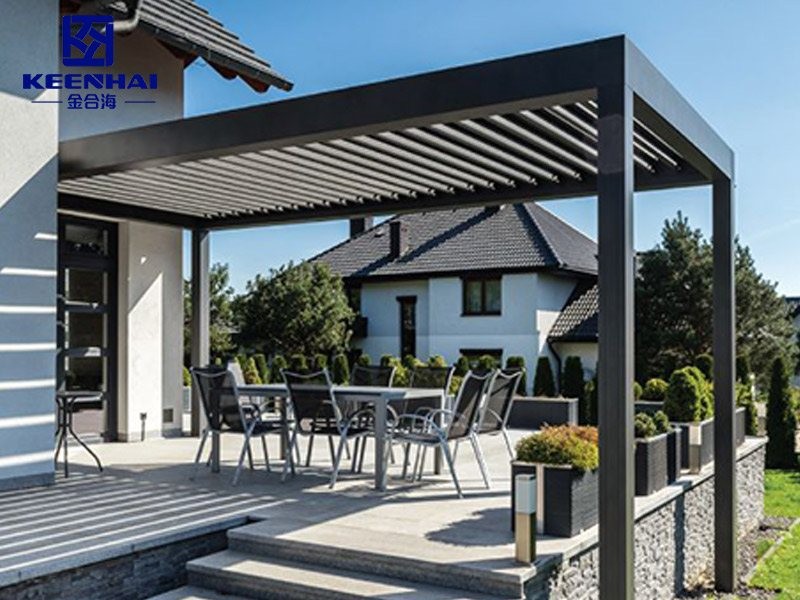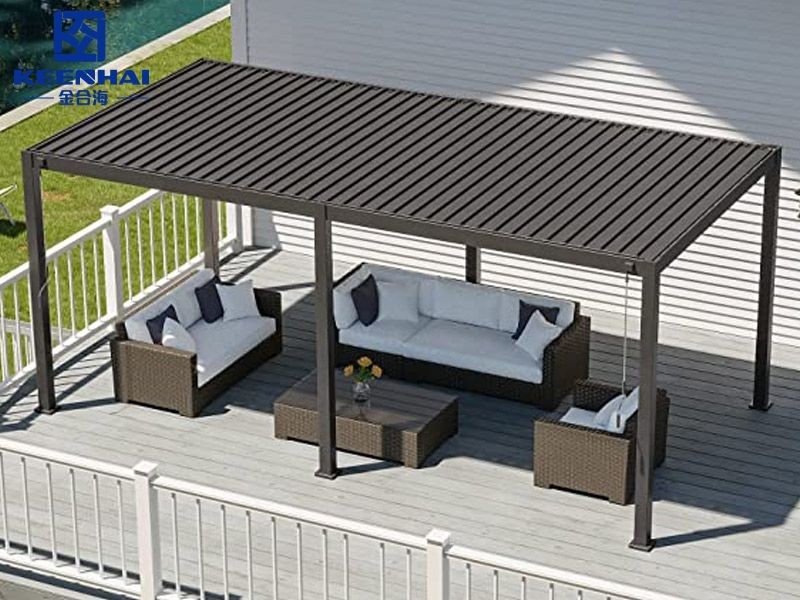
Initial Costs and Budget Considerations
Higher Upfront Cost Compared to Traditional Pergolas
Installing a louvered pergola generally costs more than a standard wooden pergola because of the adjustable louvers, advanced materials, and sometimes motorized components. On average, homeowners spend between $5,000 and $15,000 more upfront. While traditional pergolas rely on simple timber and basic craftsmanship, louvered systems use precision-engineered aluminum or composite materials that last longer and require less maintenance. Choosing high-quality materials ensures the pergola performs reliably, even under strong winds or heavy rainfall.
Additional Fees for Motorized or Automated Systems
Many louvered pergolas come with motorized louvers that allow you to control sunlight and ventilation with the push of a button. Adding these systems increases the total cost by $1,500 to $4,000, depending on automation complexity and brand. You also need to account for wiring, electrical connections, and optional smart-home integration. For homeowners who prioritize convenience and year-round usability, these extra costs are often justified by the added comfort and flexibility they provide.
Costs for Premium Materials (Aluminum, Wood, Composite)
Material choice heavily influences the budget. Aluminum options, such as a modern aluminum prefab pergola, offer low maintenance and high durability, while premium wood requires regular sealing but provides a warmer, classic look. Composite materials combine some of the benefits of both but usually cost 10–20% more than standard wood. Here’s a quick comparison:
Material Type |
Avg. Cost for 20x20 Pergola |
Durability |
Maintenance |
|---|---|---|---|
| Aluminum | $15,000–$25,000 | 25–40 years | Minimal |
| Wood (Cedar/Redwood) | $12,000–$20,000 | 15–25 years | Moderate, annual sealing |
| Composite | $16,000–$28,000 | 25–35 years | Low, occasional cleaning |
Investing in high-quality materials upfront reduces long-term repairs and ensures your pergola remains functional and visually appealing for decades.
Brand and Custom Options
If you work with a reputable provider like keenhaipergola, you gain access to premium designs, custom sizing, and expert installation. Some homeowners also consider an Aluminum Modern Gazebo or an Aluminum pergola house if they want integrated features like extended shade coverage or side panels. Choosing a trusted brand ensures quality control, warranty support, and long-term satisfaction.

Maintenance and Longevity Issues
Regular Cleaning Requirements
Even the most durable louvered pergola needs attention to stay in top shape. Dust, leaves, and pollen can accumulate between the louvers, and rain can leave water spots if the pergola is in a tree-lined backyard. In one recent project, a homeowner in Florida installed a 20x20 louvered pergola near tall oaks; weekly sweeping and occasional pressure washing kept it looking like new. Cleaning isn’t just about appearance—it prevents buildup that can trap moisture and cause corrosion over time.
Mechanical Parts and Motorized Louver Maintenance
Motorized louvers make life easier, but they come with their own upkeep. Homeowners should inspect motors, gears, and control systems every 6–12 months. In a recent California installation, a family’s automated pergola system had a minor misalignment after a windy season, which was quickly fixed with routine adjustment. Lubricating moving parts and checking electrical connections ensures smooth operation and extends the life of the pergola. Even if you choose manual louvers, occasional checks for wear or loosened screws are important.
Susceptibility to Weathering and Corrosion
Exposure to sun, wind, and rain gradually affects pergolas, even those made from aluminum. Coastal homes, for example, face salt-laden air that can accelerate corrosion on metal connectors if not coated properly. In a New Jersey outdoor dining project, the installers used powder-coated aluminum and reinforced joints to withstand winter storms, allowing the pergola to stay functional and visually appealing for over a decade. Choosing high-quality materials and protective coatings dramatically improves longevity, making routine maintenance easier and less time-consuming.
Installation Challenges
Structural Requirements and Roof Support
A louvered pergola needs a strong foundation and proper support for the roof system. The adjustable louvers add weight and mechanical complexity, so the structure must handle dynamic loads from wind, rain, and occasional snow. Typical installations follow these steps:
-
Assess the site – check soil stability, slope, and drainage to ensure a level base.
-
Install footings or piers – concrete footings usually 12–18 inches deep provide a stable anchor.
-
Assemble the frame – attach posts securely using stainless steel brackets, making sure everything is plumb.
-
Add cross beams and roof supports – support beams must align precisely to handle louver rotation and prevent sagging over time.
In one New York backyard project, installers reinforced the posts with extra brackets because the pergola was near a large tree, preventing any wobble during storms. Proper attention to structural requirements ensures the pergola functions safely for years.
Time and Labor Needed for Professional Installation
Installing a louvered pergola is not a quick weekend project. Professionals typically need 2–4 days for a standard 12x20 structure, with larger setups taking longer. The process involves:
-
Unloading and inspecting materials for defects.
-
Constructing the base and verifying measurements multiple times.
-
Assembling the frame with precise alignment of all components.
-
Installing motorized or manual louver systems and testing functionality.
Skilled labor is crucial because improper assembly can lead to uneven louvers, noisy operation, or reduced durability. Homeowners often underestimate the time required, so planning for professional installation ensures smooth execution and avoids costly mistakes.
Limited DIY Feasibility
While small pergolas might tempt DIY enthusiasts, louvered designs are challenging due to mechanical complexity and precise alignment requirements. Even experienced DIYers encounter difficulties with:
-
Correctly leveling posts on uneven terrain.
-
Aligning louvers so they open and close smoothly.
-
Installing motors and wiring safely, especially if smart controls are included.
In a Chicago installation, a homeowner attempted a DIY setup but had to call professionals when the louvers jammed due to misalignment. For most projects, hiring a professional team saves time, ensures warranty compliance, and guarantees the pergola works as intended.

Space and Functional Limitations
Size Constraints for Small Backyards
Not every backyard can fit a full-sized louvered pergola. For tight spaces, homeowners often opt for Aluminum Prefab Pergola units that come in modular sections, making installation easier without crowding the yard. In a San Diego project, a family had a narrow 180-square-foot patio. Designers installed a compact aluminum pergola with adjustable louvers, allowing enough room for seating and planters while keeping the structure functional. Careful measurement and planning ensure you maximize outdoor space without overwhelming it.
Reduced Shade Coverage During Certain Angles
Even adjustable pergolas can leave gaps in shade depending on sun angles. A modern aluminum gazebo installed in a Phoenix backyard showed that late afternoon sunlight penetrated the louvers on the western side. The solution involved installing retractable side panels to maintain comfortable shade. Homeowners in regions with low sun angles need to consider how louvers interact with daily sunlight patterns to ensure consistent comfort.
Potential Noise from Rain Hitting Louvers
Rain hitting aluminum louvers can create noticeable noise, which some homeowners find relaxing but others consider intrusive. In a Seattle outdoor dining setup, a custom Aluminum pergola house included rubber gaskets between louvers that reduced rainfall noise by nearly half. keenhaipergola designers often recommend these small tweaks to improve comfort without compromising functionality or style. Even heavy storms no longer disrupt conversation under the pergola, making it suitable for year-round outdoor use.
